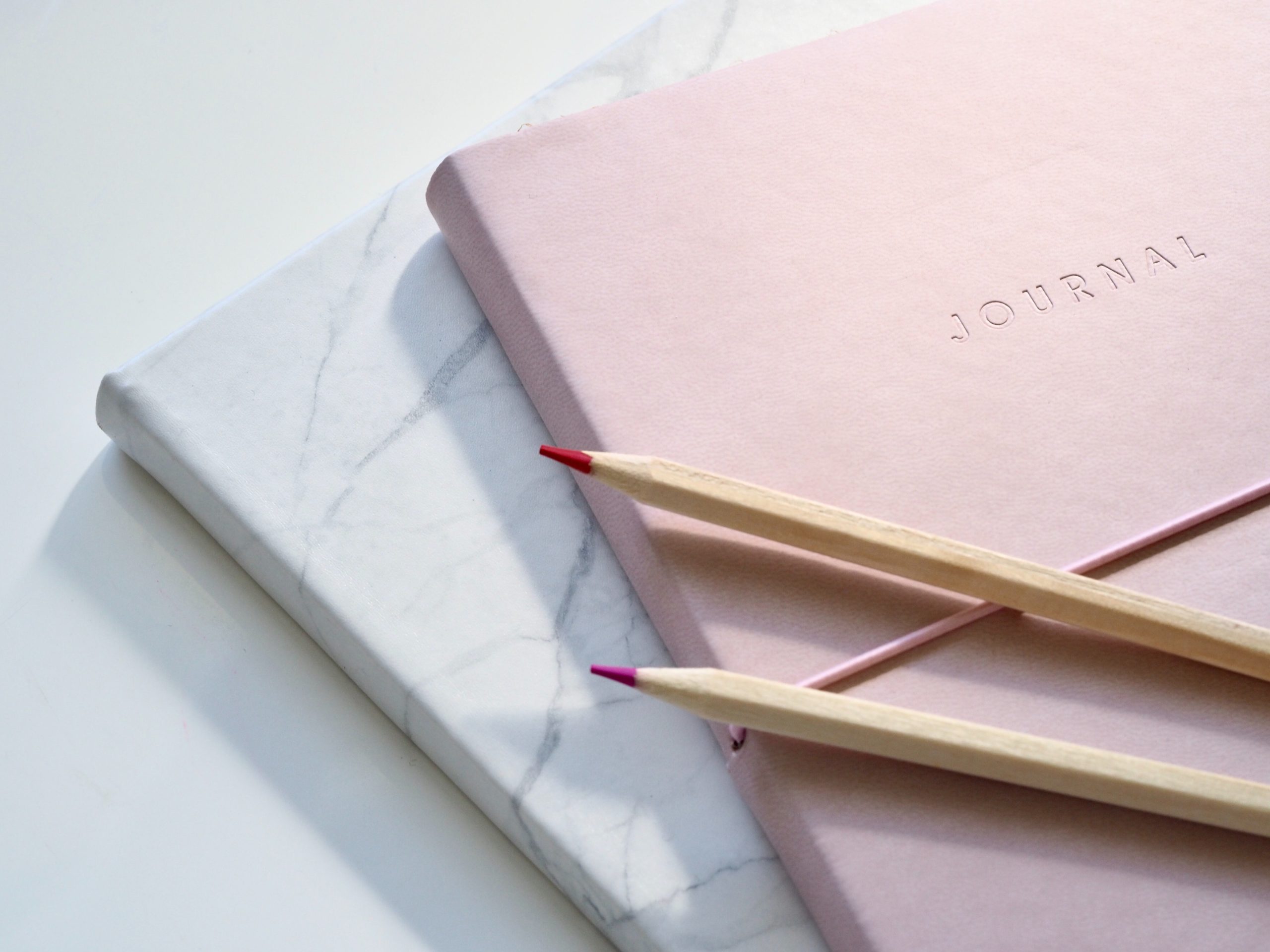by Nicolle N. (Munro)
As I sit down to write this article, on the table in front of me lie my journals from this past year.
They are different colours and sizes, some given to me as gifts, some bought in a dollar store and one from a professional office supply store. No matter what the cost, they are precious to me, as are the two people who suggested to me many years ago: “Nicolle, why don’t you start a journal?”
One of those people was my sponsor, Leslie. I was having a great deal of difficulty with prayer and surrender, and it was Leslie who said if I was having a hard time, to open up my journal and just try talking to my Higher Power. I was 22 years old when I got sober and I remember saying, “But I don’t even really know my Higher Power yet!”
Leslie also asked me if I would be willing to use my journal to write down affirmations and a gratitude list. I think I said I would be, but I know in my heart that I had no faith whatsoever in affirmations or journal writing at that time. But I listened and I was willing. The first affirmation Leslie suggested I write in my journal was “I am a sober woman of dignity and worth.”
Soon I began to get up in the morning, pray and write, focusing on simple affirmations and simple statements of what I was grateful for. At first it felt empty and foreign. My sponsor suggested that maybe that was because I was for the first time developing a real and honest relationship with myself.
Journaling was difficult for me because it took time, commitment and nurturing energy, all things that I found difficult to give to myself but desperately needed. It was through the practice of keeping a journal that I began my journey to a better and lasting relationship with a Higher Power and with myself.
Another important person in my life who suggested that I keep a journal was my counsellor at that time. Being newly sober, I sometimes felt overwhelmed by the feelings that were emerging. I needed to learn how to identify and cope with my feelings. He encouraged me to start writing down thoughts and feelings, so that I might increase my awareness and ability to cope.
I found this frightening. It was a new freedom that I wasn’t too sure how to deal with, but he helped me to move through my fears. If I was having difficulty or fear, or if I was stuck and unable to face my feelings, especially the negative ones, he suggested that I grab some scissors and a magazine and find a picture or color that helped to capture the essence of my feeling.
This really opened me up. I was also relieved to discover that journal writing wasn’t about my writing having to be “perfect”, “neat” or “intellectual.” I was given permission to make my journal my own. He suggested that I cut out images, use stickers, design my own cover, or doodle with markers. The next thing you know, I was having fun! What a miracle! Having fun while working on myself!
He also recommended a book called “The Artist’s Way” by Julia Cameron that explores many suggestions to open up one’s creative expression, including the practice of what she calls “Morning Pages.” I know that I needed help to create a more positive daily life in sobriety, of which journaling was a big part. I began to trust and to listen to myself a bit more, I felt more balanced and I began to trust that there were possibilities for fun, joy and happiness in a sober life.
Today for me, 14 and half years sober (one day at a time), journaling is an essential tool that I rely on, a quiet, intimate time devoted to my recovery and my Higher Power. In times of emotional stress, it grounds me so that I can stop and practice the slogans “Easy Does It” and “Keep It Simple”. It helps me to sort out my busy mind and to identify fears, resentments and changes that I might need help with. It helps me to work the Steps with my sponsor.
It also helps me to identify positive goals and dreams for my sobriety. Often times, I go back and re-read my journal and look for when I am saying the same thing over and over. This can be an indication to me that I need help in this area.
For me, writing is a regular, daily practice just as prayer is. Both have a positive effect on my emotional sobriety and serenity.
I have so much to be grateful for. How thankful I am to have been given the opportunity to share a little bit of my recovery with you. It seems fitting somehow that in this moment, I lack the “right” words to describe the depth of gratitude and the sense of wonder and awe I feel for the power of this program.
Maybe a colour would best describe the feeling: a bright, warm yellow and gold colour that cuts mysteriously through every dark nook and cranny, and amazingly beams strong brilliant light and warmth everywhere.
Happy Journaling!
This article is reprinted from our TGIF vault. Nicolle N. is now 24 years sober, a professional playwright, Mama to a beautiful five-year-old boy and an educator who has created a course called Creative Journaling: The Promises in Recovery for aftercare/continuing care programs. You can enroll in Nicolle’s upcoming courses here.
If you’re having trouble getting started, here are a few ideas to get you going:
- Look at a magazine and find a picture that appeals to you. Cut it out, paste it in your notebook and write about it.
- Write about an event in your life – first from your perspective and then from the perspective of someone else who was present.
- Turn a feeling – love, joy, beauty, anger or fatigue – into a character. Write a detailed description and dialog with this character.
- Allow your pen to give voice to a part of your body besides your mind. Have this part write a letter to you. Write a response.
- If you were to select music for a soundtrack of the day you’ve had, what songs would you play in the background? Why?
- Write down everything that comes into your mind about money.
- Write about a belief you’ve discarded.
- Write an entry telling another person something that you are too afraid or reluctant to tell them.

